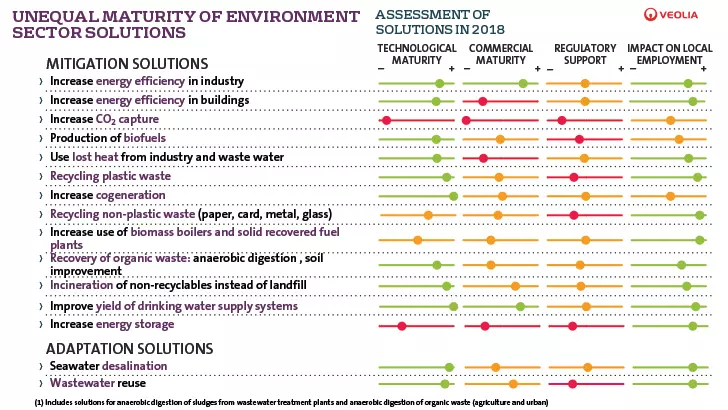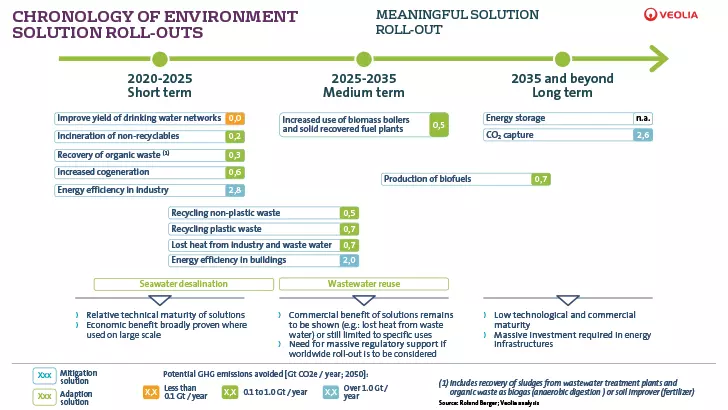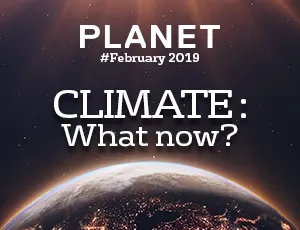During Veolia’s 2019 Press Day, Antoine Frérot, the Group’s Chairman and Chief Executive Officer, presented an optimistic and pragmatic vision of the fight against climate change.
A vision that is translated for the first time into a proposal including a very concrete action program: what climate solutions should be deployed up to 2025 (short-term), between 2025 and 2035 (medium-term), and from 2035 (long term)?
The highlights of Antoine Frérot’s presentation:
• The consequences of climate change hit people, the environment and the economy harder every year. "The longer we wait to act, the higher our ecological debt becomes. The less effort we make to reduce our CO2 emissions, the more we will have to do in the very long term to adapt to major climate change," said Antoine Frérot.
• Nevertheless, the climate battle should not be considered lost. There are numerous solutions with a considerable potential impact on the reduction of greenhouse gases (see the Roland Berger study). "With its solutions alone, the environmental services sector could deliver up to 30% of the reduction in greenhouse gas emissions needed to keep the rise in temperatures below 2°C."
• Exactly how these solutions could be implemented on a large scale has yet to be established. This is the pragmatic vision that Antoine Frérot shared.
What would it be possible and realistic to implement in the short, medium and long terms? And what would the impact be? To answer these questions, Antoine Frérot carefully examined 15 environmental services solutions on the basis of four accessibility criteria: technological maturity, commercial maturity, regulatory support received, and finally impact on local jobs. Against these criteria, the environmental services sector’s solutions show various levels of maturity:

• Depending on the different levels of maturity, several categories of solutions emerge according to the speed with which they would have an impact on reducing GHG emissions:

• To conclude his presentation, Antoine Frérot talked about the importance of ensuring a fair transition."To be accepted, a transition must benefit the environment, be socially fair and be perceived as such. We will not make a success of the energy transition by neglecting the social aspects!"
A conviction that was illustrated by the testimony of Michal Kurtyka, the Polish Secretary of State for the Ministry of Energy and the Environment and President of COP24 held in Katowice in Poland in late 2018.
Veolia's businesses could help reduce CO2e by almost a third by 2050
In 2016, the world emitted 53 Gt of CO2e into the atmosphere. If the current rate continues, CO2e emissions would reach 66 Gt by 2050. However, baseline studies show that to limit global warming to well below 2°C, CO2e emissions in 2050 should be a maximum of 26 Gt - 40 Gt less CO2e than current trends are predicting. As part of the study conducted for Veolia, Roland Berger consultants analysed the potential contribution of the energy and environmental sectors to this emission reduction goal. First lesson: these players’ solutions now cover 5 of the 7 sectors with the highest emissions. They address 19 Gt of emissions, i.e. ⅓ of the current total emissions.
Second lesson: deployed on a large scale, 13 solutions developed by the energy and environmental sectors could help avoid the emission of 12 Gt of GHGs by 2050, i.e. 29% of the emissions that must be reduced by 2050. These solutions range from energy efficiency in buildings and industry - which accounts for more than 40% of the 12 Gt of GHGs that must be reduced – to waste recycling and energy recovery from wastewater.
Energy and environment sector solutions to the challenges of climate change
Watch the complete presentation of Antoine Frérot, Emmanuel Pages (Roland Berger) and Michal Kurtyka
Elabe Survey for Veolia: French people are prepared to contribute to the financing of solutions in favor of the environment
French people are ready to be agents of change : they say that they are prepared to contribute to the financing of solutions in favor of the environment... provided that they know how such financing is allocated and that this is guaranteed. 77% of those surveyed would agree to pay 1 cent more on the price of a soda bottle made using recycled plastic. And 70% would be ready to pay 1% more imported jeans if it guarantees that they are being shipped ecologically. And last but not least, 63% would even be prepared to pay a car 160€ more to guarantee it is made from “green” steel.



